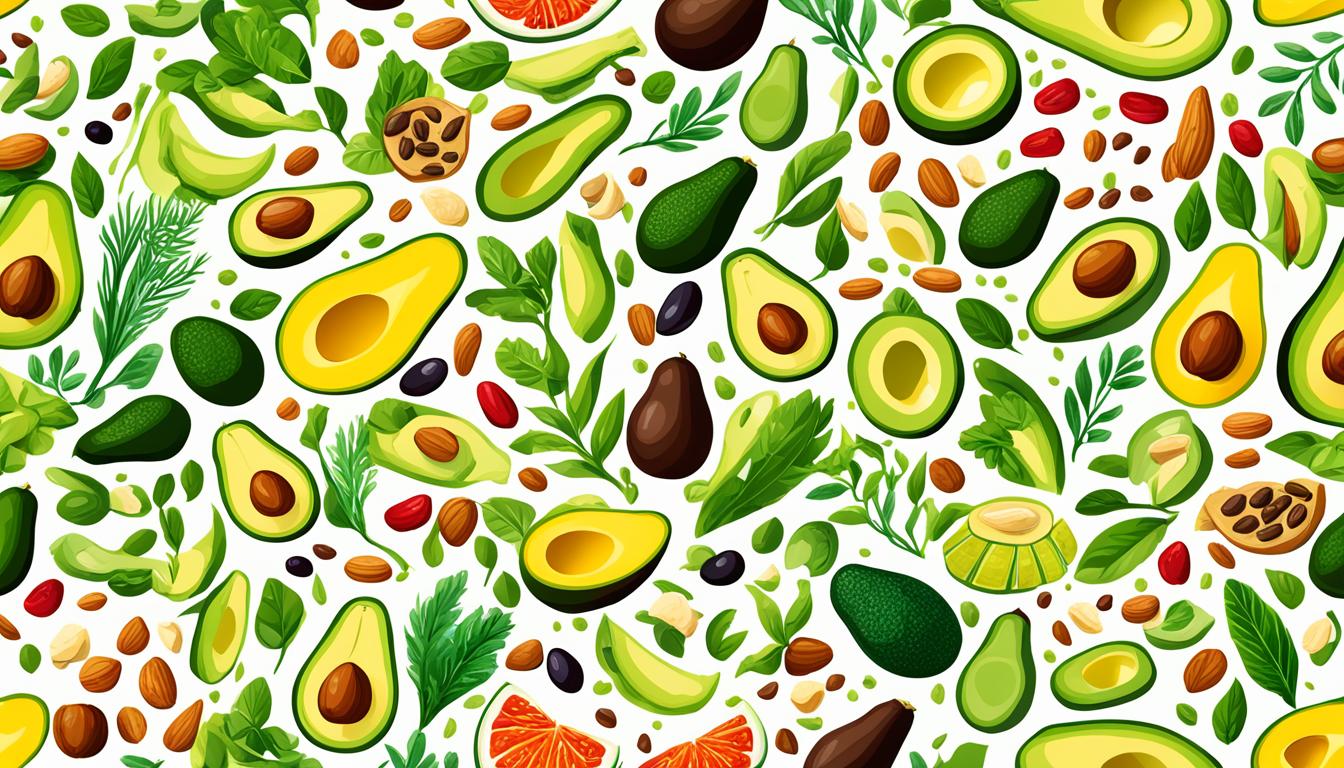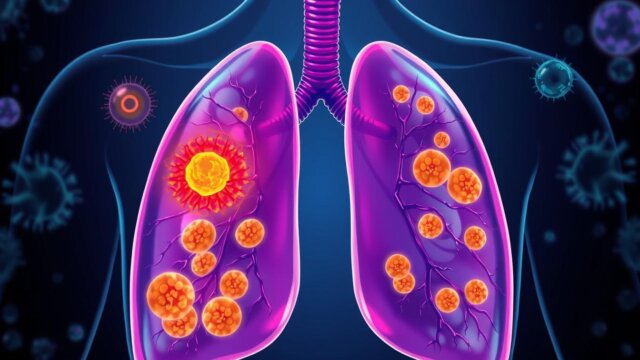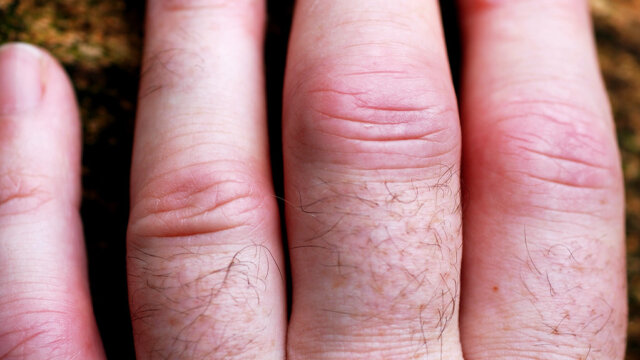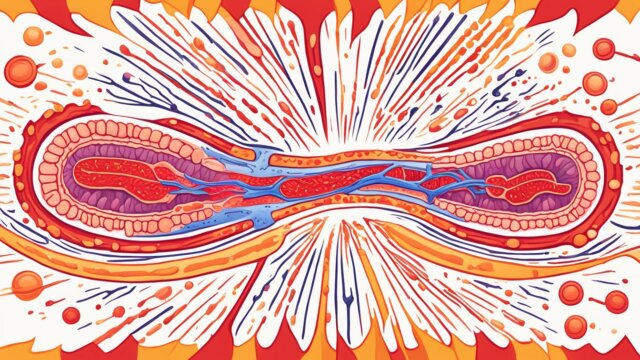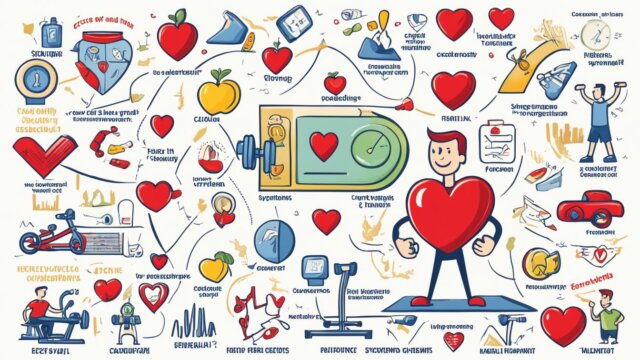FTC disclaimer: This post may contains affiliate links and we will be compensated if you click on a link and make a purchase.
Did you know the average American eats almost twice the daily fats they should? This fact shows how vital it is to know about different fats and their effects on health. Not all fats are the same – adding healthy fats to your meals can boost your health and well-being.
Healthy fats, like omega-3 fatty acids, monounsaturated fats, and polyunsaturated fats, are key for your body. They give you energy, help cells work right, protect important organs, and aid in absorbing vitamins. Knowing about these fats helps you pick foods that are good for you.
Key Takeaways
- Dietary fats are essential nutrients that provide energy, support cell function, and protect organs.
- Not all fats are created equal – healthy fats like omega-3s, monounsaturated fats, and polyunsaturated fats offer numerous benefits.
- Saturated and trans fats can have negative impacts on cholesterol levels and heart health.
- Incorporating healthy fats from sources like avocado, olive oil, nuts, and fish can improve overall health.
- Understanding the types of fats and their effects is key to making informed dietary choices.
The Importance of Healthy Fats
Fats are key for our bodies. They give us energy, help cells work right, protect organs, and help absorb vitamins. Eating foods with healthy fats is good for our hearts and our guts.
Fat’s Role in the Body
Fats are important for many body functions. They give us lots of energy, more than carbs or protein. They also help make and fix cell membranes and help get vitamins A, D, E, and K into our bodies.
Types of Dietary Fats
There are four kinds of fats we eat: saturated, trans, monounsaturated, and polyunsaturated. Each kind affects our health in different ways. Experts say we should get 20 to 30% of our daily calories from fats.
Fat Type | Food Sources | Health Effects |
|---|---|---|
Saturated Fats | Cheese, butter, full-fat dairy, red meat, coconut oil, palm oil | Raise HDL (good) cholesterol, but also increase LDL (bad) cholesterol. |
Trans Fats | Partially hydrogenated oils, fried foods, baked goods, margarine | Increase LDL (bad) cholesterol, decrease HDL (good) cholesterol, and contribute to inflammation and insulin resistance. |
Monounsaturated Fats | Avocados, nuts, olive oil, canola oil | Decrease LDL (bad) cholesterol and increase HDL (good) cholesterol, reducing the risk of heart disease. |
Polyunsaturated Fats | Fatty fish, walnuts, flax seeds, chia seeds, sunflower oil | Decrease LDL (bad) cholesterol and increase HDL (good) cholesterol, reducing the risk of cardiovascular disease. |
Knowing about the different fats and their health effects helps us choose better fats for our diets.
Saturated Fats: The Unhealthy Kind
Fats are important for our bodies, but not all fats are the same. Saturated fats are bad for us because they can raise cholesterol and harm the heart. You can find these fats in animal foods like meat and dairy, and some plant oils like palm and coconut oil.
Sources of Saturated Fats
You can find saturated fats in many foods. These include red meat, high-fat dairy like cheese and butter, and oils like coconut and palm oil. A lot of Americans get these fats from desserts and junk food.
Impact on Cholesterol Levels
Eating too much saturated fat can raise “bad” LDL cholesterol. This can lead to plaque in arteries, which increases heart disease risk. But, not everyone reacts the same way to dietary cholesterol.
Studies show replacing saturated fats with polyunsaturated fats can lower heart disease risk. Monounsaturated fats in foods like nuts and avocados also help improve cholesterol and lower heart disease risk.
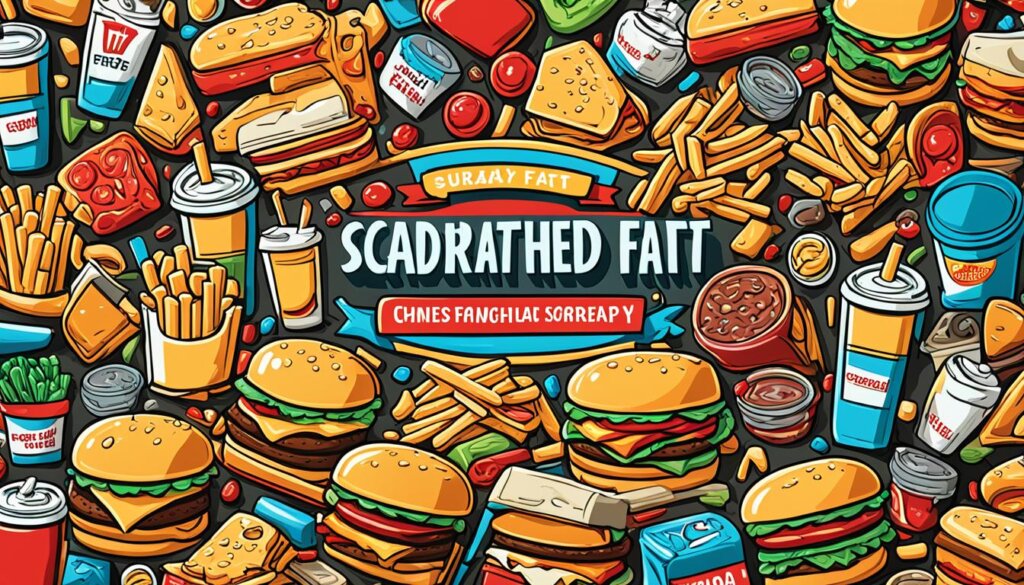
Saturated fats have been seen as bad for a long time, but the story is more complex. Research is still exploring how different saturated fats affect our health, from heart disease to diabetes. It’s important to eat these fats in moderation for a balanced diet.
Trans Fats: The Worst Offenders
Trans fats are the unhealthy fats to watch out for. They are found in partially hydrogenated vegetable oils. These fats can raise “bad” LDL cholesterol and increase heart disease risk. High LDL and low HDL cholesterol are big risks for heart disease, the top cause of death in the U.S.. The FDA wants us to avoid trans fats to prevent heart attacks and heart disease.
Trans fats are in many processed and fried foods. Some breakfast sandwiches have up to 6g of trans fat. Certain ice cream flavors and non-dairy creamers also have trans fat.
Products can be labeled as having “zero grams” of trans fat if they have less than 0.5g per serving. This means even healthy-looking items like microwave popcorn might have trans fat.
To cut down on these bad fats, eat more plant-based meals and choose low trans fat toppings for desserts. Making these changes helps keep your heart healthy and avoids the bad effects of trans fats.

There are efforts to remove trans fats from food. The Australian government worked with food companies to reduce trans fats in 2007 and 2009. The World Health Organization says over 500,000 deaths each year are linked to trans-fatty acids.
The fight against trans fats is ongoing. By knowing what to avoid and making smart food choices, you can protect your heart and health.
“Manufacturers are required to list only total fat and saturated fat on food labels, with trans fat not being mandatory unless the product makes a specific claim like ‘No trans fat,’ in which case it must be disclosed on the nutrition information panel.”
Monounsaturated Fats: A Heart-Healthy Choice
Monounsaturated fats are better for your heart than saturated and trans fats. They help keep “good” HDL cholesterol levels up and lower “bad” LDL cholesterol. These fats are liquid at room temperature, unlike solid saturated and trans fats.
Food Sources of Monounsaturated Fats
Olive oil, avocados, and nuts like almonds and peanuts are great sources of monounsaturated fats. Other foods high in these fats include canola oil, safflower oil, sunflower oil, peanut oil, and butter. Adding these fats to your diet can boost your heart health.
Food Source | Monounsaturated Fat Content |
|---|---|
Olive Oil | 73% monounsaturated fat |
Avocado | 67% monounsaturated fat |
Almonds | 62% monounsaturated fat |
Peanuts | 48% monounsaturated fat |
Switching to monounsaturated fats can lower bad cholesterol and triglycerides. This reduces the risk of heart and blood vessel diseases. This change can greatly improve your heart health.
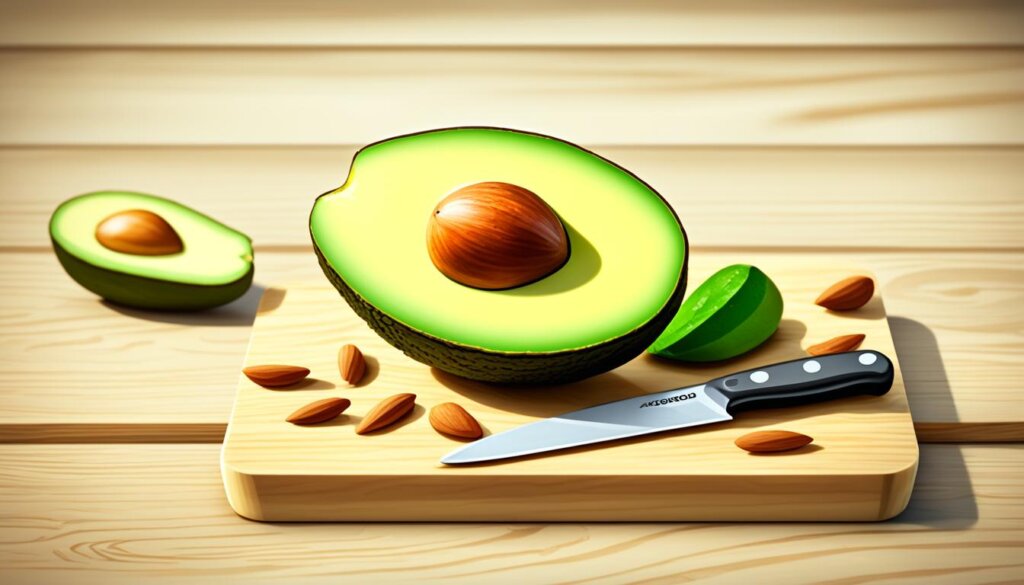
“Diets high in omega-3 fatty acids, found in oily fish, seeds, and nuts, may lower triglyceride levels in the blood and reduce the risk of heart and blood vessel diseases.”
Choosing heart-healthy monounsaturated fats is key to keeping your heart in good shape.
Polyunsaturated Fats: Essential for Health
Polyunsaturated fats are key for your health. They include omega-3 and omega-6 fatty acids. Your body can’t make these fats, so you need to get them from food. Omega-3s are in fatty fish and nuts, helping your heart and brain. Omega-6 fats are in vegetable oils and nuts, important for a balanced diet.
Omega-3 Fatty Acids
Omega-3s are vital for your brain and cell growth. You can find them in fatty fish like salmon and nuts. These fats help lower heart disease risk. Pregnant women should eat 2-3 servings of low-mercury fish weekly for the baby’s health.
Omega-6 Fatty Acids
Omega-6s are also good fats and can lower heart disease risk. But, we eat too much omega-6 in the West, which can cause inflammation and illness. It’s important to balance omega-6 and omega-3 fats for health.
Eat foods like fatty fish, nuts, and plant oils to get the right fats. These include omega-3s and omega-6s from safflower and flaxseed oil. Remember, all fats are high in calories, so eat them in moderation for a balanced diet.
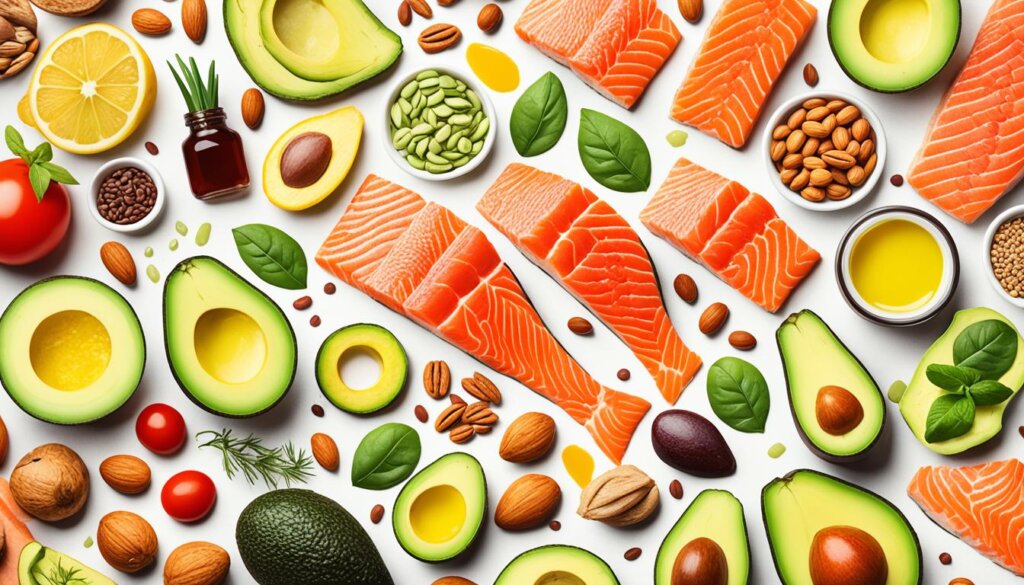
“Polyunsaturated fats, including both omega-3 and omega-6 fatty acids, are considered healthy fats and may reduce the risk of heart disease when substituted for saturated fats.”
Reading Food Labels for Healthy Fats
Reading food labels helps you make smart choices about diet fats. Labels show the total fat and specific amounts of saturated and trans fats. Choose foods low in saturated and trans fats. Go for those with more unsaturated fats, like monounsaturated and polyunsaturated.
Look at the serving size and the daily value (DV) for nutrients on the label. For example, a frozen lasagna serving has 280 calories and 9g of total fat, which is 12% of the DV. But, eating two servings means 560 calories and 18g of total fat, or 24% of the DV.
Also, check the cholesterol, sodium, and fiber levels. Aim for foods with less sodium to keep salt intake in check. Foods with 3-4 grams of fiber per serving are good for your diet.
Understanding food labels helps you make better choices. This way, you get the right fats and nutrients for your health and well-being.
“Reading food labels can empower you to make healthier choices, ensuring you consume the right balance of fats and other essential nutrients.”
Healthy Fats in a Balanced Diet
Adding healthy fats to your diet is key for good health. The American Heart Association says 20-35% of your daily calories should be from fat. Focus on unsaturated fats. This helps your heart, keeps cholesterol levels healthy, and gives you many benefits.
Recommended Fat Intake
The quality of fat matters as much as how much you eat. The American Heart Association says to eat two servings of fatty fish a week for omega-3 fatty acids. Also, add healthy fats like avocado, nuts, and olive oil to your meals. Choosing unsaturated fats helps you stay healthy and balanced.
Food Item | Fat Content |
|---|---|
Mackerel (3 oz serving) | 11.8 g fat, 15.8 g protein |
Chia Seeds (1 oz serving) | 8.7 g fat |
Dark Chocolate (1 oz, 70-85% cocoa) | 12.1 g fat, 6.95 g saturated fat |
Avocado (100 g serving) | 14.7 g fat |
Flaxseed (100 g serving) | 27.3 g fiber, 42.2 g fat |
Almonds (1 oz serving) | 14.1 g fat |
Tofu (100 g serving) | 4.19 g fat, 10.9 g protein |
Olive Oil (1 tbsp) | 14 g fat |
Adding these healthy fats to your diet helps your heart, brain, and gives you many benefits.
Incorporating Healthy Fats into Your Meals
Adding healthy fats to your meals is easy and tasty. Choose plant-based oils like extra-virgin olive oil, avocado oil, or coconut oil. These oils are full of good fats and can be used for many cooking methods.
Cooking with Healthy Oils
Extra-virgin olive oil is great for cooking on low to medium heat. Avocado oil is best for high heat, like in stir-fries. Coconut oil adds a unique taste to your food. Try these oils to make your meals tasty and healthy.
When planning your meals, think about how much healthy fat you’re using. Aim to get about 25% of your daily calories from healthy fats. You can do this by using a bit of olive oil, adding nuts or seeds to salads, or eating fatty fish like salmon.
Choosing wisely about the fats you eat brings great taste and health benefits. Adding these important nutrients to your meals is easy and helps your health a lot.
Benefits of Eating Healthy Fats
Eating healthy fats is good for your heart and brain. Foods like olive oil, avocados, and fatty fish have lots of benefits. They make you feel better overall.
Improved Heart Health
Healthy fats can lower “bad” LDL cholesterol. This can cut your risk of heart disease. Studies show eating more polyunsaturated fats can help.
Eating seafood once a week can also lower your heart disease risk.
Better Brain Function
Healthy fats have omega-3 fatty acids. These are good for your brain. They help keep your brain working well as you get older.
To get the most from healthy fats, eat a balanced diet. Include unsaturated fats in 8-10 percent of your daily calories. Also, eat less saturated and trans fats to help your heart and brain.
“Eating healthy fats is essential for maintaining a well-functioning body and mind. The benefits of these nutrients are far-reaching, from improved heart health to better cognitive function.”
Choose to eat healthy fats to improve your health. This can help you feel better now and in the future.
Tips for Reducing Unhealthy Fat Intake
It’s key to eat healthy fats but also cut down on bad fats like saturated and trans. Making smart choices can boost your health. Here are tips for eating less of these bad fats:
- Choose lean protein sources over high-fat meats. Pick lean red meat, skinless poultry, and fish.
- Go for low-fat or non-fat dairy like skim milk, low-fat yogurt, and reduced-fat cheese.
- Stay away from fried and processed foods, which are full of bad fats.
- Use healthy oils like olive or avocado oil instead of butter or shortening when cooking.
Lowering bad fats can greatly improve your health. Focus on whole, nutrient-rich foods and smart swaps. This way, you can eat well and feel great.
Food Item | Healthier Choice |
|---|---|
Butter | Olive or avocado oil |
High-fat cheese | Low-fat or non-fat cheese |
Fried foods | Baked or grilled foods |
Fatty cuts of meat | Lean cuts of meat |
These easy food swaps can cut down your intake of unhealthy and fats. Enjoy a diet that’s both tasty and healthy.
“Reducing your intake of saturated and trans fats is one of the most effective ways to improve your heart health and overall well-being.”
Remember, eat healthy fats in moderation. Try to keep saturated fat under 10% of your daily calories, and avoid trans fats as much as you can. These changes can lead to a balanced diet that boosts your health.
Conclusion
Healthy fats are key to a balanced diet. They help your body in many ways. By adding healthy fats to your meals, you get lots of benefits. These fats help your heart health and brain function. They also boost your overall wellness.
In the US, many people struggle with obesity. In 2011-2012, 8% of adults were obese. It’s important to eat right and focus on healthy fats. Experts like the American Heart Association offer advice to lower heart risks.
Choosing the right healthy fats is smart. They make your diet better. Adding them helps your heart health, brain function, and wellness. Let healthy fats be a big part of your healthy life.,
FAQ
What are the different types of dietary fats?
There are four main types of dietary fats: saturated, trans, monounsaturated, and polyunsaturated. Each type affects health differently.
Why are some fats considered unhealthy?
Saturated and trans fats are bad for you. They can increase “bad” LDL cholesterol. This can lead to heart problems.
What are the benefits of consuming healthy fats?
Healthy fats like monounsaturated and polyunsaturated fats are good for the heart. They keep “good” HDL cholesterol levels up. They also reduce heart disease risk and help the brain work better.
Where can I find sources of healthy fats?
Healthy fats are in plant-based oils like olive and avocado oil. They’re also in fatty fish, nuts, and seeds. These foods have important fats like omega-3 and omega-6.
How can I incorporate more healthy fats into my diet?
Add healthy fats to your meals with plant-based oils, avocado, or nuts. Include fatty fish like salmon in your meals too.
How can I identify healthy and unhealthy fats on food labels?
Check food labels for fat types. Choose products low in saturated and trans fats. Pick those with more unsaturated fats.
How much fat should I consume as part of a balanced diet?
Aim for 20-35% of your daily calories from fat. Focus on healthy fats like monounsaturated and polyunsaturated fats.
What are some tips for reducing unhealthy fat intake?
Cut down on unhealthy fats by choosing lean proteins and low-fat dairy. Avoid fried and processed foods. Use healthy oils like olive or avocado oil for cooking.
